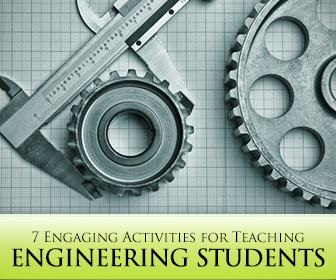
Engineering is notorious for clear cut formulas and logical steps with predictable outcomes; pretty much the opposite of writing in a foreign language.
There are all kinds of exceptions and variations to learn and master. If you are teaching an English for specific purposes (ESP) course for engineers, you may find they get frustrated with the idiosyncrasies of writing in English. Never fear! Here are some activities to teach scientific writing to Engineering students

Useful Ideas for Teaching Writing to Engineers
-
1
Writing Reports
This will most likely be the primary writing task of an engineer. Teach students how to get to the main point quickly, using as few words as possible. Be sure to teach students the appropriate levels of formality depending on who will receive the reports.
Activity: Put a random sampling of materials in a bag (pencils, erasers, staplers, notebooks, paperclips, scrap paper, soda cans, etc...) and group the students. Give the students 15 minute to design and build some type of product (maybe a tower, a tool of some sort , etc...) When students are finished, have them write a report detailing the materials available, how to recreate the product, the potential uses of the product, and how to improve the product.
-
2
Conducting Research
Conducting and reporting on research will also be a critical part of an engineer’s job, especially if they are still students or have yet to complete university. Equip students with the appropriate digital literacy skills to navigate the Internet and find the necessary information.
Activity: Assign students or pairs of students a popular invention; find some obscure inventions to ensure that they don’t already know about this invention. Students should research the invention and the inventor and then write a report summarizing the findings.
-
3
Producing E-mails
Whether communicating with their boss or with clients, engineering students will need to know how to communicate via e-mail. Review proper etiquette such as subject lines, greetings, closings, formal language, and being concise without being rude.
Activity: Randomly assign roles to a student: client, boss, co-worker, etc... and then pair students up together. Have the students create a situation using their assigned role where they would need to e-mail an engineer. They should practice all aspects of the e-mail including subject lines, greetings & closings, and formality by writing an e-mail to the engineer. When the students receive the e-mail, they must come up with an appropriate response to practice writing to different types of audiences.
-
4
Making Writing More Concise
Scientific writing will mainly be brief and concise. There will probably be not a big demand for academic essays and flowery language in an Engineer’s practice. Although less words may sound enticing to learners, it can actually be more difficult. The main grammar points you will want to address are reduced adverb, adjective, and noun clauses. For example, The compartment which houses the wires is beneath the lid becomes. The compartment housing the wires is beneath the lid or Before you remove the wires which are blue, you should turn off the power becoming. Before removing the blue wires, turn off the power.
Activity: Find a suitable passage on the Internet or create your own passage that has a lot of superfluous descriptive flowery, wordy language (much like this sentence). Group students as you wish (individuals, pairs, or small groups) and have them try to remove and rewrite as much of the passage as possible. At the end, compare passages with the class to see who kept as much original meaning as possible with the fewest words.
-
5
Using Vocabulary
Within the field of engineering, your students may be going into a number of branches, such as civil, chemical, mechanical, electrical, aeronautical, automotive, etc... If you have a group of engineers from the same branch, you can narrow down the field-specific vocabulary to practice. If you have a diverse group of engineers, stick to scientific general terms that will be useful in writing and in their reading.
Activity: A good Engineering vocabulary game is a classification listing activity. Divide students into teams, and give each group a piece of paper. Call out a specific category of vocabulary, for example “Things you find in a laboratory” and have students create lists of all the vocabulary they know that fits this category. If your categories are too broad or students too advanced, choose a specific letter in advance and only permit answers beginning with the specific letter.
For a variation on this activity, pair two students from the same team and give them each a piece of paper, but don’t allow them to see each other’s papers. Call out a specific category and have students write down three vocabulary words from this category. If the students write down the same word, give that team a point.
-
6
Writing Memos
Engineers are often called upon to write memos to clients, colleagues, or their bosses detailing progress on a project or sending announcements. Prepare your students for this task by teaching them appropriate memo format and language. Like reports, memos should be polite but direct and to the point, using as concise of language as possible.
Activity: For practice, assign students throughout your course to write weekly or daily lesson memos (depending on how often your class meets). For example, if you have a 9-week term, assign 9 students or pairs of students to create a memo each week, summarizing the events, homework, and topics addressed in the classroom. Not only will this help students who have to be absent, it will help students practice the memo format of writing.
-
7
Know your resources
In writing, the best knowledge you can give your students is where they can go for help if they get stuck. Introduce your students to what these resources look like, what they can help with, and how to use them. This will encourage students to look at the resources even if they’re not being assigned to do so. There are a number of good writing resources for engineers on the Internet. Some of the best include:
http://owl.english.purdue.edu/owl/section/4/19/
http://www.vtecc.eng.vt.edu/EngComResources.htm
Although most engineers may prefer numbers to words, it doesn’t have to stop you from making writing lessons that are effective, useful, and even fun for future engineers.
What are writing tips you have for the science fields?
P.S. If you enjoyed this article, please help spread it by clicking one of those sharing buttons below. And if you are interested in more, you should follow our Facebook page where we share more about creative, non-boring ways to teach English.







